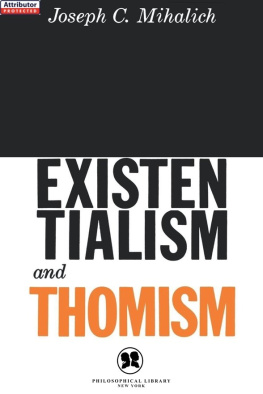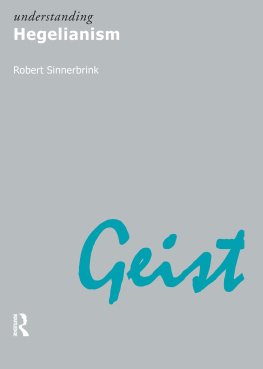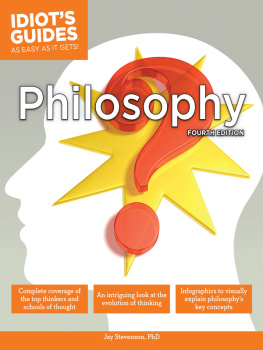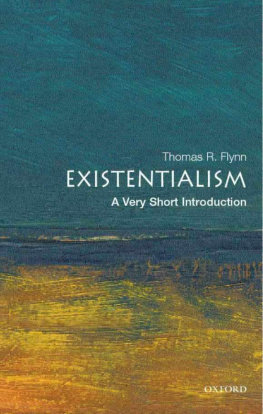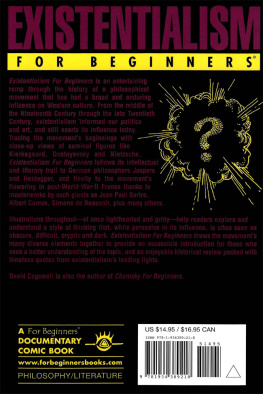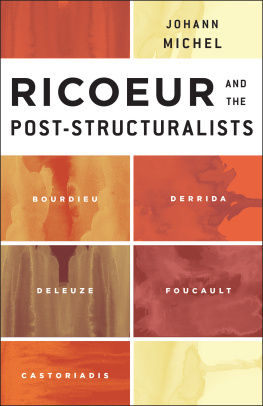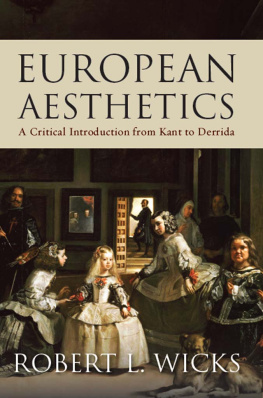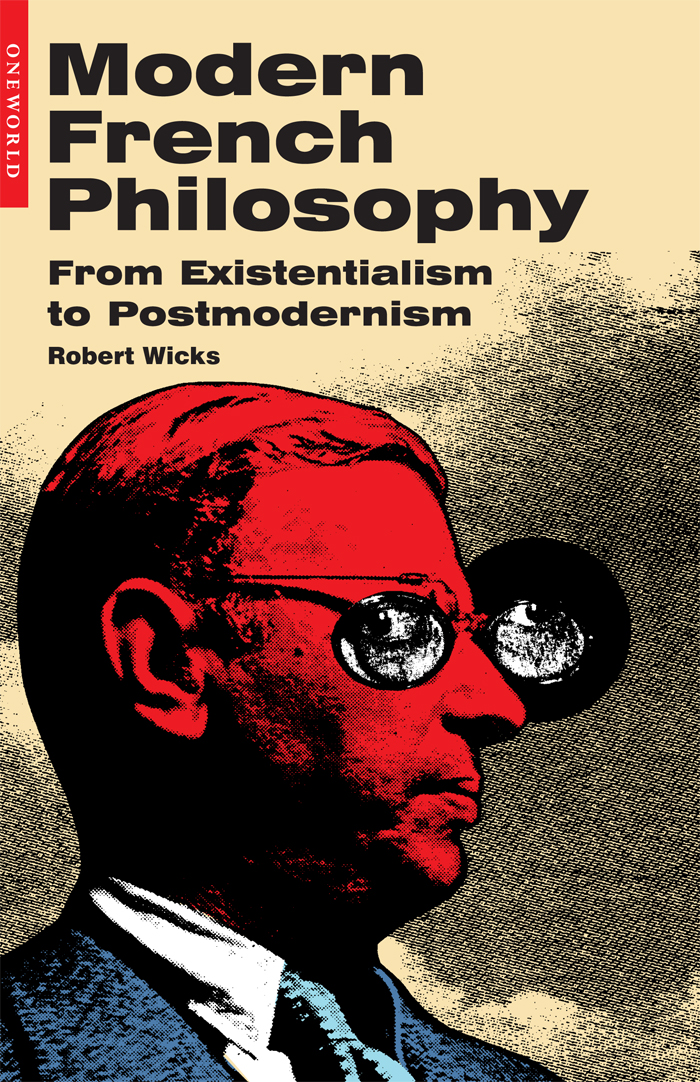Praise for Modern French Philosophy
Robert Wicks has done us all a great service with his Modern French Philosophy. It is a book that we have needed for many years, and Wicks has done a superb job in summarizing the history of philosophy in France from surrealism, existentialism and structuralism to the virtual surrealism of recent postmodernism. Obscure and difficult texts are translated into comprehensible English; cross-connections and historical references, many of them unexpected, are laid out for our appreciation; cautious criticisms, interspersed with the exposition, are offered for the students consideration. For those of us who teach courses in modern French philosophy but despair of making the material readily accessible to our students, Wicks book is a welcome pedagogical gift.
Robert C. Solomon, University of Texas at Austin
This book surveys the complex and bewildering field of twentieth-century French philosophy and manages to pick out significant trends without sacrificing attention to detail. Existentialism, structuralism, poststructuralism and postmodernism are important components of our own intellectual context, but they are more often than not only loosely understood. Robert Wicks remedies this situation by providing a lucid, comprehensive account of French thought in the last century. The book is written with admirable clarity, and the analyses of both individual thinkers and broader movements are impressively accessible and authoritative. This book can be recommended wholeheartedly to anyone interested in the subject.
Colin Davis, University of Warwick
The book is an extremely readable account of a vast panorama of thinkers, presented in a clear and comprehensible fashion without sacrificing too much in the way of detail or complexity. Relationships as well as differences are brought out, historical affiliations and influences are lucidly explored, and it is carried out with a keen eye for the whole as well as its parts.
Christina Howells, University of Oxford.
RELATED TITLES
Descartes, Harry M. Bracken, ISBN 1851682945
God: A Guide for the Perplexed, Keith Ward, ISBN 1851683232
Kierkegaard, Michael Watts, ISBN 1851683178
Moral Relativism: A Short Introduction, Neil Levy, ISBN 1851683054
Nietzsche, Robert Wicks, ISBN 1851682910
Philosophy and Religion: From Plato to Postmodernism, Max Charlesworth, ISBN 1851683070
Sartre, Neil Levy, ISBN 1851682902
Wittgenstein, Avrum Stroll, ISBN 1851682937
Modern French Philosophy
From Existentialism to Postmodernism
Robert Wicks

For Ingryd Valentina and Gladys
MODERN FRENCH PHILOSOPHY: FROM EXISTENTIALISM TO POSTMODERNISM
Oneworld Publications
10 Bloomsbury Road
London WC1B 3SR
England
www.oneworld-publications.com
This ebook edition published in 2013
Robert Wicks 2003
All rights reserved.
Copyright under Berne Convention.
A CIP record for this title is available from the British Library.
ISBN 9781851683185
eISBN 9781780744568
Cover illustration by Andrzej Klimowski;
cover design by Perks-Willis Graphic Design
Typeset by Saxon Graphics Ltd, Derby, UK
Stay up to date with the latest books,
special offers, and exclusive content from
Oneworld with our monthly newsletter
Sign up on our website
www.oneworld-publications.com
Contents
(Nobel Prize in Literature, 1927)
(Nobel Prize in Literature, 1964, declined)
(Nobel Prize in Literature, 1957)
Structuralist Views: 1950s67
Poststructuralist Views: 196880
Preface
Much of twentieth-century French philosophy can be understood as a quest for freedom, stimulated by the problem of understanding ones place in the world as both an individual and as a social being. This quest was peculiar, though, because it was formulated against a confusing background, namely, an array of scientific and technological developments that appeared inconsistently to be both supportive and threatening to human well-being. The present study, unlike most surveys of this period, will highlight underappreciated continuities, as well as recall familiar discontinuities, between the various segments and strata of twentieth-century French philosophical thought. The hope is to develop a more satisfying understanding of modern French philosophers, by revealing a greater coherence to this intellectually vibrant time period than is usually noted.
It often happens that wide-ranging histories of philosophical thought sacrifice detailed analysis of argument for expository flow, and are formulated at a level of generality that precludes readers from appreciating the argumentative nuances of the philosophical theories under consideration. In light of this often-encountered condition, the present critical and integrative exposition of twentieth-century French philosophical thought aims to achieve balance in a different way: as a rule, we will examine key arguments from each author, and these will be situated within a broader exposition of the authors viewpoint. The resulting narrative atmosphere will compare to a helicopter excursion: sometimes we will ascend to survey the extensive landscape; sometimes we will descend to cruise along the treetops for a closer and more rapid view; often we will stop to explore carefully, and with some patience, the intellectual gardens and shapes of the tiny flowers of thought. We will continue in this way until we reach the end of the century, when we will look back to formulate a surrealistic and freedom-centered meaning that will comprehend the survey.
French philosophical thought during the twentieth-century is more varied and thematically interesting than some other comparable segments in the history of philosophy, for the influential writers were confined neither to academic settings in general, nor to university philosophy departments in particular. And yet, all of the writers were deeply reflective in spirit. We will consider the ideas of psychoanalysts, artists, novelists, linguists, essayists, literary critics, anthropologists, sociologists, and political activists, in addition to those who worked in academic philosophy departments. A remarkable feature of French philosophical thought during this period, is that its representatives come from every intellectual avenue, influencing the entire scholarly scene, and much of the popular intellectual scene. As a testament to their stature and recognition beyond the French national boundaries, several of these thinkers, namely, Henri Bergson, Albert Camus, and Jean-Paul Sartre, were awarded or were offered, Nobel Prizes in Literature, which indicates their notable place within the wider French, European, Western, and worldwide cultural settings.
The historical and descriptive categories that have applied traditionally and conveniently to our complicated subject French thought, twentieth-century thought, existentialism, structuralism, poststructuralism, and postmodernism, among others are useful and familiar schematic designations. As rigid and abstract terms, however, they also tend to mislead us into overlooking the complexity, multidimensionality and multi-interpretability of the cultural and philosophical phenomena at hand. To take a small example, consider how conventional calendar markings such as 1900 and 2000, along with related designations such as twentieth-century French thought or twentieth-century European thought, can generate the expectation that major calendar divisions will match significant cultural and intellectual transitions. We can easily question, though, whether there are any clear joints within the cultural sphere which naturally correspond to calendar divisions, if only because so many momentous discoveries and important historical events happen unpredictably, by accident, and on arbitrary dates.



